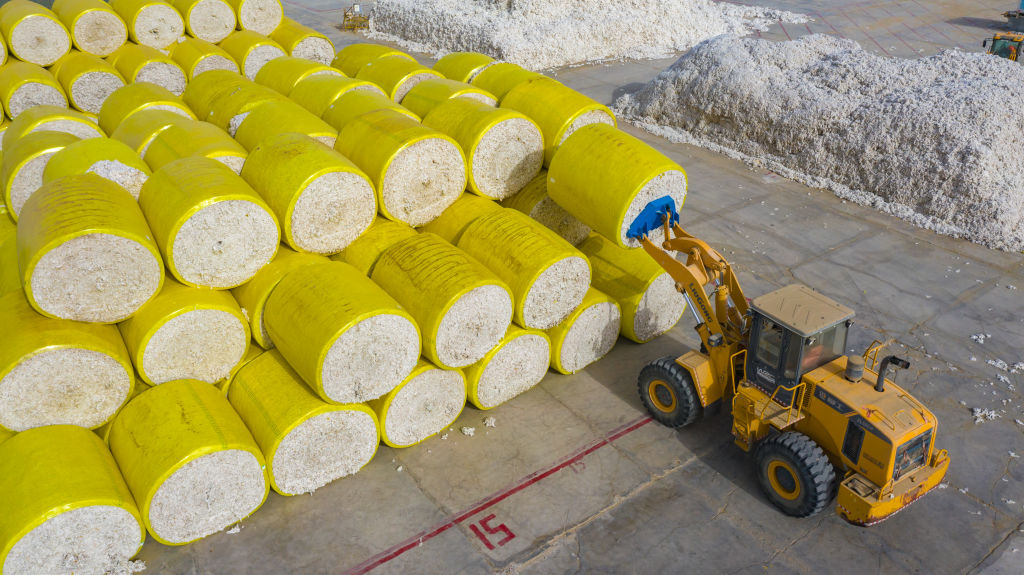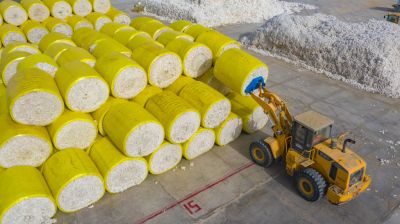Congress’ ability to monitor how customs officials are implementing a law blocking imports made with forced labor is seriously limited, an unintended outcome members and staff are considering how to resolve.
When lawmakers passed the Uyghur Forced Labor Prevention Act in response to the Chinese government’s ongoing genocide in the northwestern region of Xinjiang last year, they were confident they could make sure the Biden administration would implement it as intended. It required Customs and Border Protection (CBP) to inform and explain to eight congressional committees every exception it grants to the import restrictions.
But in the past few months, CBP has released hundreds of shipments into America after initially stopping them for suspected ties to forced labor from Xinjiang. And the agency hasn’t shared with Congress the details of those decisions, nor the evidence considered in making them, according to congressional aides and a CBP spokesperson.
That’s because the releases have come after a different kind of review than the one laid out in the law. Executive agencies often have latitude in implementing legislation as long as they fulfill its goals, but this outcome doesn’t match the transparency Congress desires.
“The intent of the law is clear,” Sen. Marco Rubio, a Florida Republican who was a lead sponsor of the legislation, said Wednesday in a statement to The Dispatch. “Congress will continue oversight of its implementation and if bad actors are creating loopholes to allow the importation of goods into the U.S. made by slaves then we will act to shut down those loopholes. It is that simple.”
A CBP spokesperson told The Dispatch this week that of the roughly 2,200 shipments (valued at more than $728 million) the agency has stopped under the law since June, more than 300 have been released. They include chemical products, agricultural goods, textiles and apparel, household goods, and solar panels, according to the CBP spokesperson.
Lawmakers will almost certainly scrutinize the decision to release solar panel shipments: During the long effort to pass the legislation, senior Biden administration officials privately lobbied against the bill, worried it would hamper the president’s green energy agenda. Because many solar panel components are linked to Xinjiang, blocking them could hobble the White House’s efforts to boost the use of renewable energy.
“Some folks within the administration really felt like this bill would be damaging for our efforts on climate,” Sen. Jeff Merkley, the Oregon Democrat who cosponsored the bill and petitioned the White House on its behalf for months in 2021, said in an interview with The Dispatch earlier this year.
In interviews this week, Democratic and Republican aides involved with the legislation said they want to make sure the administration isn’t using climate concerns to dictate CBP’s execution of the law.
The Uyghur Forced Labor Prevention Act assumes all products made in whole or in part in Xinjiang are tainted with forced labor. The result—on paper—is a comprehensive ban on goods made in Xinjiang, products whose supply chains source materials from Xinjiang, and products made by companies or groups involved in forced labor transfers from the region to other parts of China.
Exceptions are supposed to be granted only if a given importer proves with “clear and convincing evidence” that forced labor was not connected to the product. Meeting that threshold would require thorough evidence such as independent audits of factories and information about employees.
But since CBP began detaining shipments under the law, companies wanting to contest those detentions have bypassed the “clear and convincing evidence” standard and instead argued essentially that customs agents got it wrong: The law doesn’t actually apply to their products because they have no inputs from Xinjiang or any banned entities.
When an importer contests a detention, CBP officials conduct “applicability” reviews, a CBP spokesperson said. The roughly 300 shipments in question were released because “the importer contended and demonstrated that the supply chain does not touch Xinjiang” or an entity using labor transfers. To date, no importer has requested the type of review described by the law itself, which would be to meet the “clear and convincing evidence” standard against forced labor.
Even if each CBP decision to release a detained shipment has been sound, lawmakers want to know what kind of evidence companies are submitting in applicability reviews and how CBP is evaluating it.
Ana Hinojosa, a former senior CBP official who worked on forced labor enforcement, suggested in an interview with The Dispatch in September that some businesses have opted for those reviews because they haven’t involved congressional oversight.
In the six months since the law went into effect, lawmakers haven’t been aggressive in monitoring enforcement. Congressional committees with oversight responsibilities have convened no hearings with CBP officials to examine implementation. When asked about it by The Dispatch this week, some of the committees entitled to receive notification of exceptions from CBP didn’t appear aware that they should.
This may be the result of a busy calendar or election year distractions. It also may be because powerful trade committees like House Ways and Means and Senate Finance didn’t play a major role in passing the bill. It was drafted and advanced by lawmakers and staff on the Congressional-Executive Commission on China, a panel dedicated to human-rights issues.
CECC staff have had several calls with CBP officials since the law was passed to check in on enforcement. And New Jersey GOP Rep. Chris Smith, the likely chair of the panel in the upcoming Congress, told The Dispatch last week he plans to hold a hearing on the roll-out of the forced labor law next year and invite administration officials to testify.
Customs officials have warned from the beginning it may take a while for CBP to ramp up enforcement of the Uyghur Forced Labor Prevention Act. They have asked Congress for more resources and plan to hire new employees.
Despite increased enforcement this year, products likely to have been made with forced labor are still entering the United States. The Uyghur Human Rights Project published an investigation in August that found red dates connected to Xinjiang in seven grocery stores in the D.C. area and websites offering Xinjiang dates for shipping to the United States.
The New York Times this week reported that major car companies rely on Xinjiang for supplies, suggesting cars sold in the United States could be tainted with forced labor.
Experts are also concerned that direct shipments from e-commerce sites, typically of low value, get little CBP scrutiny. Bloomberg News reported in November that it tested shipments from the major Chinese retailer Shein and found cotton in their clothing from Xinjiang.
Even if CBP provides more information to Congress about its decisions related to the forced labor law, there’s also the threat that it could get drowned out.
“All these committees get thousands and thousands and thousands of pages every year in reports and updates and documents from executive branch agencies,” a senior House aide said. “It’s a flood. They can’t keep up with it. So all that stuff goes into a folder or onto a shelf and exists. The requirement is satisfied. But unless someone opens it up and reads it and bothers to understand it, then there’s nothing to be done with it.”






Please note that we at The Dispatch hold ourselves, our work, and our commenters to a higher standard than other places on the internet. We welcome comments that foster genuine debate or discussion—including comments critical of us or our work—but responses that include ad hominem attacks on fellow Dispatch members or are intended to stoke fear and anger may be moderated.
With your membership, you only have the ability to comment on The Morning Dispatch articles. Consider upgrading to join the conversation everywhere.